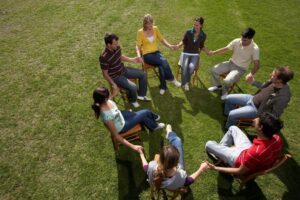
In mid-October we attended a friend’s wedding in Cancun, Mexico. Destination weddings are always an adventure; traveling to—and exploring—unfamiliar terrain, meeting new people, and participating in one on life’s more sacred experiences. With the exception of a few members of the wedding party, we were the only non-family members in attendance. Our part as guests, and our job as friends of the bride, and by proxy the groom, was to witness and hold-space for the communing of their two families, most of which—as is the case with many weddings—were meeting each other for the first time.
Celebrating the union of two people who have chosen each other as life-partners can be one of life’s more joyful, heart-filled, and loving experiences. These gatherings can also trigger emotions of loss, regret, and resentment. Depending on which side of the emotional-aisle you are seated; wedding celebrations can be experienced as an inclusive communing or a magnified experience of exclusion. The same could be said about any family gathering, for that matter. In either case we were well suited for our space-holder assignment.
At the rehearsal dinner we were seated next to family members of the groom; an uncle, his wife, and their two pre-teen aged boys. We engaged in standard wedding guest conversation, “How do you know the bride and groom?” and, “How far did you travel?” and, “Isn’t the resort lovely?,”etc. Once it was clear these family members were on the heart-filled side of the emotional-aisle, our conversation branched out to a more organic and engaging interaction. Not too far into the meal, Bella, the aunt, made reference to her child-hood years growing up in Poland. Not only did this information help me to identify her accent, but, having traveled to Poland, it opened up a conversation about the history and culture of a people that had captured my heart.
Bella and I chatted for almost and hour, at times, becoming oblivious to our table mates and the other fifty guests. For every question I had, she had a story the share, and I absorbed every detail. At one point in our visit we were discussing family dynamics and cultural traditions. Appropriate to our conversation, Bella had made reference to her experience of how Americans generally do not respectfully (really) listen to each other and, even more infrequently acknowledge what they appreciate and cherish about each other, as a cultural practice. Having been born during the final years of communist Poland, Bella’s family and community had access to the minimal basics, “We took care of, and gave thanks for what we did have.”
Bella shared with me about the Christmas Wafer, Oplatiki and the Catholic Christmas tradition celebrated in Poland. Before sitting down for the Christmas Eve meal, the family gathers around the table. The eldest member holds a large wafer and breaks off a piece to begin the ritual. The remaining wafer is passed on to another member while a prayer for loved ones is said. This continues until everyone at the table has a piece of the wafer. Finally, each family member gives wishes to every other family member, in the form of on acknowledgment of appreciation, consuming a piece of wafer broken off of the wafer piece of the person to whom they were giving their wishes. The Christmas wafer symbolizes the unity of the family, which many consider to be the main pillar of society. The wafer also symbolizes forgiveness and reconciliation.
During her first Christmas in the United States, Bella was celebrated the holiday with her new husband and his American family. At their Christmas Day gathering, Bella introduced her extended family to the Polish tradition of Oplatiki and, with a makeshift wafer of saltine crackers, she facilitated them through the process. She was amazed at how awkward this exchange of appreciation was, at first. The family members as individuals and as a collective, struggled, not so much with what to say, but rather, with the vulnerability of having the clearing and the permission to articulate previously repressed affection. It wasn’t long, however, before the energy of the group dynamic shifted and, through tears and outbursts of joy, everyone unleashed a tsunami of appreciation. When the family sat down for dinner, they did so with a distinct shift in connection and an expanded experience of loving communion.
That weekend, on the beach of Cancun, we had all gathered to celebrate the union of two people who had chosen each other as life-partners, and the communing of two families. The wedding day was everything weddings are supposed to be; a joyful, heart-filled, and loving experience, as well as a few triggered emotions of loss, regret, and resentment. However, no matter which side of the emotional-aisle people were seated, it was a magnified experience of inclusion. The reception was filled with touching speeches, beautiful songs, joyful dancing, and an abundance of bella oplatiki moments.

